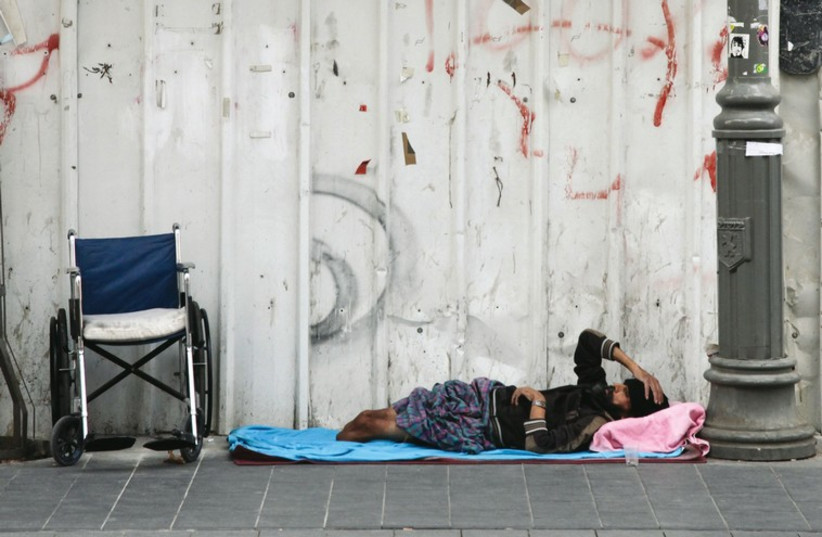Poverty rates in Israel are among the highest - opinion
Poverty is not predetermined and gaps can be narrowed if we set our minds to it.
Two million Israelis live in poverty, according to the annual report of the National Insurance Institute, published earlier this month. This number is 0.5% higher than the previous year – from 20.5% to 21% – with over a fifth of Israelis living below the poverty threshold.
This alarming statistic continues the adverse trend of increased prevalence of poverty in the country over the last decade. The rising cost of living in Israel also doesn’t bode well, and there is a real fear of a collapse of the middle class and an expansion of the circle of poverty.
Poverty rates in Israel are among the highest in developed countries around the world and in the OECD (Organization for Economic Cooperation and Development) poverty rates, second only to Costa Rica. Poverty in Israel is unequally distributed and is much higher in the socio-geographic periphery; it is even higher in the Arab and ultra-religious populations.
Yet poverty doesn’t discriminate. It doesn’t care about religious belief, skin color or gender. It strikes when and where it can and whomever it can. Poverty is the opposite of justice. Poverty is hunger, suffering and pain that begets ignorance and violence, which Israeli society is facing on a daily basis on the roads, in schools and in medical clinics.
The path to fighting inequality and narrowing poverty is well-known to decision-makers. Firstly, there is a need for public investment in the development of work skills and supporting low-income workers, to help them integrate into the workforce in a meaningful way. These are the most important actions that the current government must forcefully advance.
Decision-makers have to wake up and realize: low-wage jobs deepen the disparities of disadvantaged populations and don’t do anything to break the poverty cycle. The government’s job is to help those who choose to work and provide them with the support that will allow them to earn meaningful wages, offering them new horizons.
Innovative governmental infrastructure
We at 121 work diligently to advance this vision. We aim to establish an innovative governmental infrastructure that will offer high-quality courses, funded by public money. The courses will offer diverse professional development to scores of low-wage and unemployed workers.
Beyond that, if the government wants to tackle poverty at its roots, it needs to invest in education early on – from birth to age three. Research shows that care and education during the first three years of a child’s life are highly important for children’s cognitive, mental development and motor skills. We must emphasize the importance of investing in early education, as it has the power to narrow future social gaps.
We have a moral obligation to train the educators responsible for teaching infants and toddlers, and give them the professional knowledge and tools needed to provide quality education. At the same time, we must find resources to raise the wages of educators, to encourage additional quality human capital to join the field.
Finally, the government must find ways to support the elderly in Israel. Many don’t have a pension and are living in poverty. Disbursements can be distributed in an intelligent and differentiated manner, so that those in greater need will receive more.
This can cut costs and help those in need. After all, in a rich and developed country such as Israel, the elderly should not have to choose between food and medicine.
Poverty is not predetermined, and gaps can be narrowed if we set our minds to it. We call on decision-makers to quit wasting time. After many years of elections and social and economic inactivity, we must begin advancing our children’s education and work to narrow the social gaps in Israel.
The writer is CEO of 121, an NGO founded five years ago to advocate for concrete solutions to fundamental problems in employment, education, welfare and housing for the entire society. Visit www.jgive.com/new/he/ils/donation-targets/90295.
Jerusalem Post Store
`; document.getElementById("linkPremium").innerHTML = cont; var divWithLink = document.getElementById("premium-link"); if (divWithLink !== null && divWithLink !== 'undefined') { divWithLink.style.border = "solid 1px #cb0f3e"; divWithLink.style.textAlign = "center"; divWithLink.style.marginBottom = "15px"; divWithLink.style.marginTop = "15px"; divWithLink.style.width = "100%"; divWithLink.style.backgroundColor = "#122952"; divWithLink.style.color = "#ffffff"; divWithLink.style.lineHeight = "1.5"; } } (function (v, i) { });

